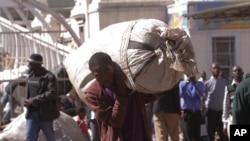Although Zimbabweans have a reputation of being innovative and resilient in the face of hardships, most people, including those who are fortunate enough to have formal employment, are increasingly finding it difficult to make ends meet as the country’s economic problems continue unabated.
Bulawayo resident and housewife, Mrs. Nancy Ndlovu, says she's anxious that schools are less than a week away from opening for the year’s third and final term and she has no money to pay for her son's school fees.
Mrs. Ndlovu has a son in boarding school on the outskirts of Bulawayo and a daughter in primary school.
Her husband, a civil servant, is finding it difficult to provide for their small family.
Mrs. Ndlovu says with the country’s economic problems worsening, she and her husband are facing serious challenges in sending their children to school while catering for the family on a daily basis.
“As a result of high unemployment, many ordinary Zimbabweans have been pushed into the informal sector, where they try to make ends meet through buying and selling all sorts of goods, ranging from vegetables to second-hand clothing.”
Mrs. Ndlovu says she has also tried to earn an income through such trade but notes that she quickly opted out because she was making losses as there are too many people on the streets trying to sell something.
“Another Bulawayo resident, who chose to be identified only as MaMoyo, also says life is getting tougher for her family. MaMoyo’s husband has been working in South Africa for nearly 20 years. She says well before the country adopted multi-currencies, she and her husband were able to build a house in Pumula High Density suburb.
But the unemployed MaMoyo says she now has to buy and sell vegetables at home in order to help supplement her husband’s income which is now too stretched.
Twenty four year-old Zibusiso Mageza is a holder of an accounting and finance diploma from a local institution of higher learning. He told Studio 7 his hopes of getting employment immediately after attaining his diploma were quashed as he found himself competing with thousands of other young job seekers, some with far better qualifications than him.
He says his plight worsened when he became an unemployed father.
“But unlike most young people who get frustrated and wallow in self-pity in the face of hardships, after identifying an opportunity during a stint in South Africa, Mr. Mageza has just started a company which supplies industrial chemicals to local companies.
He quickly admits, however, that it has not been an easy journey.
Director Reverend Useni Sibanda of the Zimbabwe Institute for Social Transformation says besides its traditional role of ministering, the church is being compelled to assist many people materially as the country’s economy continues to tank.
But Reverend Sibanda says it remains the government’s paramount duty to create employment.
Zimbabwe’s economy has been in a free fall since the hotly disputed 2013 elections that brought President Robert Mugabe’s Zanu PF back into full control of power in the country after another disputed election in 2008 had resulted in a coalition government.
Although President Mugabe promised to create two million jobs in five years following the 2013 national polls, the situation is getting worse for most people with the Zimbabwean leader blaming western sanctions for the country’s ills.
But some observers say the government's failure to respect the rule of law, among other issues, are largely to blame for the country's woes.


















